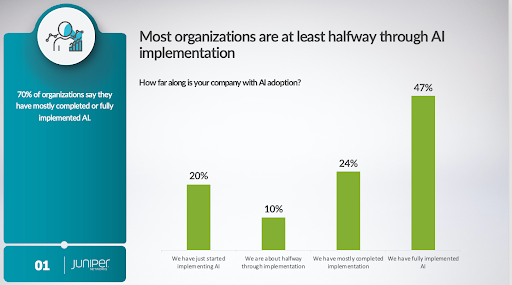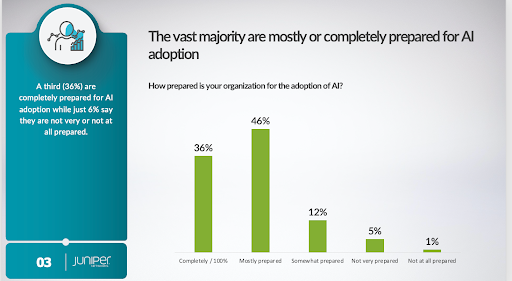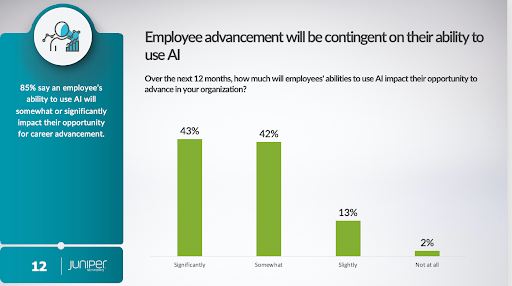-
Some 70% of respondents to the Juniper/Wakefield study say they’ve mostly completed or fully implemented AI
-
The vast majority–82%--of respondents say they are mostly or completely prepared for AI adoption
-
But about half of the respondents say they’re kept up at night with AI concerns
When it comes to artificial intelligence (AI), enterprise leaders are oddly split between confidence and fear, according to a survey by Juniper Networks in partnership with Wakefield Research.
On the one hand, most enterprise leaders say their organizations are well along in their AI implementations — at least halfway through. Some 70% of respondents said they have mostly completed or fully implemented AI, according to the survey of 1,000 enterprise leaders conducted in October. (See chart below.)

Likewise, the vast majority–82%—of respondents say they are mostly or completely prepared for AI adoption. (See chart below.)

This level of confidence seems unbelievable at first, considering the generative AI boom is only about 13 months old, with the launch of ChatGPT on Nov. 30, 2022.
However, the confidence makes sense because the survey focuses on AI in general — which has been around for more than 70 years — not specifically GenAI, Juniper CIO Sharon Mandell said in an email.
Also, 87% of surveyed leaders felt pressured to adopt AI quickly, often adding AI capabilities without a strategic foundation, she said. “This rush may lead to a superficial sense of preparedness, where the depth of integration and understanding of AI's full potential and implications might not be as advanced as claimed,” she said.
The confidence displayed in the Juniper/Wakefield survey is in line with findings in a late-2023 report by Omdia, says analyst Bradley Shimmin. In that study, Omdia found that 24.8% of companies are implementing or already moved GenAI into production, with 25.7% saying they’re pilot testing, 12.8% saying they’ve fully adopted, 27.3% considering, and only 9.5% of respondents saying they’re not interested in GenAI.
“Previously, the barrier we were seeing for generative AI and NLP [natural language processing] was hellishly high,” Shimmin said. Recent technology breakthroughs have brought AI within range of most organizations.
Not in production
Still, most enterprises are not employing AI in production, according to Gartner analyst Whit Andrews. “Less than half of CIOs described themselves as ‘employing AI’ in a Gartner survey conducted last year,” Andrews said in an email. “Of the organizations employing AI, about 10-20% are using it in a mature fashion — meaning that they are using it in multiple departments, for multiple processes, do so in more than five use cases, and do so for more than 3 years in production.”
Dig even a little below the surface of the Juniper/Wakefield findings, and you see a lot of worries. About two-thirds (68%) of respondents are “very concerned” or “extremely concerned” that departments outside their own “are rushing to implement and use AI without understanding how to properly use it.”
Some 52% of respondents say that they’re being kept up at night by concerns about their organization’s use of AI is falling behind others in the industry, while 50% are losing shut-eye over worries that employees in the organization are using AI without understanding how it works.
More concerns:
- 87% are concerned they are rushing to implement AI without understanding how to properly use it
- 87% say it may not be possible to know if their company’s AI output is accurate
- 89% say employees trust AI more than they should
- A virtually unanimous 99% of those polled believe that their AI outputs are impacted by bias
- And 74% indicated they believe their company’s AI policies are behind the curve
“The optimism about AI’s potential coexists with valid concerns about falling behind competitors, employee misunderstanding of AI and inadequate infrastructure,” Mandell said.
Additionally, some 78% of those surveyed expect that the implementation of AI will lead to more responsibility for employees.
And employee advancement will depend on mastering AI. Some 85% of survey respondents said “an employee’s ability to user AI will somewhat or significantly impact their opportunity for career advancement,” Juniper said.

Juniper is in the process of being acquired by HPE, a $14 billion deal announced last month. Juniper’s AI capabilities are driving the deal, with HPE drawn to Juniper’s popular Mist AI platform that could help HPE develop AI-powered enterprise systems to further automate business networking.
Not surprisingly, Juniper holds itself up as a provider of infrastructure that can help companies get ready for AI. “Our AI-native infrastructure is a perfect example of how we are thinking about this process at Juniper,” Mandell said. The company’s AI-Native Networking Platform uses AIops to optimize for AI and “address practical deployment and management challenges while unlocking the full potential of AI to transform operations and enhance user experiences.”
Mandell added, “We’ve made some bold moves and big bets on AI at Juniper, and we anticipate that after the initial AI frenzy, we’ll see more companies taking similar steps – strategically building and designing with AI from the start, versus bolted-on AI solutions that lack appropriate understanding and infrastructure.”
